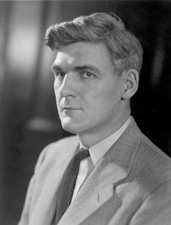Joseph H. Ball
| Joseph H. Ball | |
|---|---|
 |
|
|
United States Senator from Minnesota |
|
|
In office October 14, 1940 – November 17, 1942 January 3, 1943 – January 3, 1949 |
|
| Preceded by |
Ernest Lundeen Arthur E. Nelson |
| Succeeded by |
Arthur E. Nelson Hubert Humphrey |
| Personal details | |
| Born |
Joseph Hurst Ball November 3, 1905 Crookston, Polk County Minnesota, USA |
| Died | December 18, 1993 (aged 88) Chevy Chase, Maryland |
| Political party | Republican |
| Alma mater |
Antioch College Eau Claire Normal School University of Minnesota |
Joseph Hurst Ball (November 3, 1905 – December 18, 1993) was an American journalist, politician and businessman. Ball served as a Republican senator from Minnesota from 1940 to 1949. He was a conservative in domestic policy and a leading foe of labor unions. He helped draft the Taft-Hartley Act of 1947. Ball was best known for his internationalism and his support for a postwar world organization, that became the United Nations. However, after 1945 he was an opponent of the Marshall Plan.
Ball was born in Crookston, Minnesota, on November 3, 1905, and graduated from high school in 1922. He financed his education at Antioch College by planting corn on borrowed land and held jobs during his two years there as a telephone linesman, a construction worker, and a factory employee. In 1925, he transferred to Eau Claire Normal, and then to the University of Minnesota, but never earned a degree. In 1927, he got a reporting job at the Minneapolis Journal. When he sold a story to a pulp magazine for $50, he quit to become a free lance writer, and spent a year writing paperback fiction before returning to journalism, this time for the St. Paul Pioneer Press. In 1934, he became the paper's state political reporter, and befriended assistant county attorney Harold Stassen, a fellow Republican. As a columnist in the Pioneer Press, Ball was critical of President Franklin D. Roosevelt and the Democratic-majority in Congress, but he also opposed isolationism in foreign policy. In the meantime, Stassen was elected governor of Minnesota.
When Senator Ernest Lundeen, an isolationist, was killed in a plane crash, Stassen appointed Ball to fill the remaining two years of Lundeen's term. One of the youngest persons ever to become a U.S. Senator, Ball, at thirty-five, was also the first Senator to be required to register for conscription. After being sworn in on October 14, 1940, Ball stunned isolationist Republicans in his first speech on the Senate floor, calling for the United States to aid Britain as "a barrier between us and whatever designs Hitler and his allies may have on this continent."
...
Wikipedia
